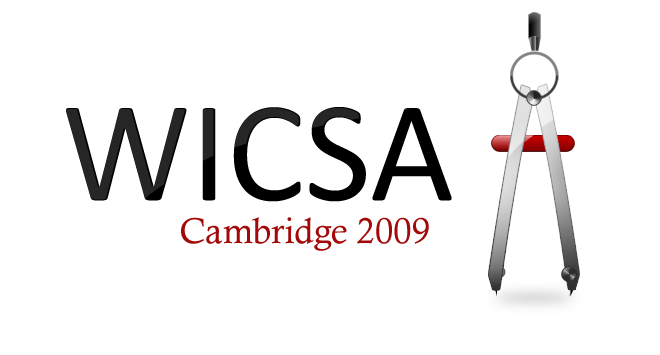

The following workshops are planned for WICSA/ECSA 2009. Visit each workshop's web site for further details, the Call for Participation and the latest information.
web: SOAR'09
when: Monday, 14 September 2009, 9:00 – 17:00
organizers:
Danny Weyns, Katholieke Universiteit Leuven, Belgium
Sam Malek, George Mason University, USA
Rogerio de Lemos, University of Coimbra, Portugal
Jesper Andersson, Växjö University, Sweden
contact: SOAR'09
Self-adaptability has been proposed as an effective approach to automate the complexity associated with the management of modern-day software systems. Self-adaptability endows a software system with the capability to adapt itself at runtime to deal with changing operating conditions or user requirements. With the term "Self-Organizing ARchitectures" (SOAR) we refer to an engineering approach for self-adaptive systems that combines architectural approaches for self-adaptability with principles and techniques from self-organization. Research works on self-adaptive systems mostly take an architecture-centric approach for developing top-down solutions, while research works on self-organizing systems mostly take an algorithmic/organizational approach for developing bottom-up solutions. Whereas both lines of research have been successful at alleviating some of the associated challenges of constructing self-adaptive systems, persistent challenges remain, in particular for building complex distributed self-adaptive systems. The awareness grows that for building complex distributed self-adaptive systems, principles from both self-adaptive and self-organizing communities have to be combined. The general goal of SOAR is to provide a middle ground that combines the architectural perspective of self-adaptive systems with the algorithmic perspective of self-organizing systems.
web: EASA'09
when: Monday, 14 September 2009, 9:00 – 17:00
organizers:
M. Ali Babar, Lero, University of Limerick, Ireland
Patricia Lago, VU University Amsterdam, The Netherlands
Paris Avgeriou, University of Groningen, The Netherlands
web: W3
when: Monday, 14 September 2009, 9:00 – 17:00
organizers: Paul Clements, John Klein and Rob Wojcik, SEI/CMU, USA
Enterprise, System of Systems, System, and Software architectures explicitly or implicitly play critical roles in developing complex systems and the ultimate success or failure of those systems. Yet, what constitutes each of these architectures, their relationships to each other, and their significance in developing successful systems is often vaguely understood. Often, projects and organizations develop unique distinctions between the types of architectures, based on application domain, organizational boundaries, or the skills of specific individuals, introducing risks to the system as some design decisions "fall through the cracks" and other decisions are delayed due to unclear or overlapping authority. This workshop will seek a more structured and systematic treatment of the relationship between the types of architecture.
web: http://www.architecting.co.uk/wicsa2009.php
when: Monday, 14 September 2009, 13:30 – 17:00
organizers: Chris Cooper-Bland, Endava, UK and Peter Eeles, IBM, UK
Some projects will benefit from more architectural investment than others; as Grady Booch says "You don't need architecture to build a dog kennel, but you'd better have some for a skyscraper". Simplistically, complex systems need a greater focus on architecting than simple systems, but what should you consider when deciding how much architecting is required on a given project?